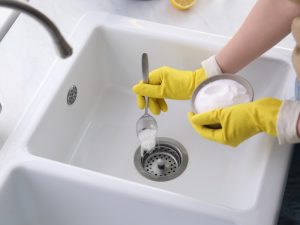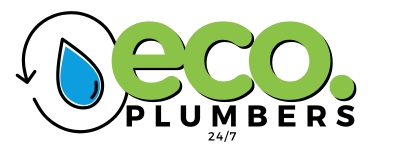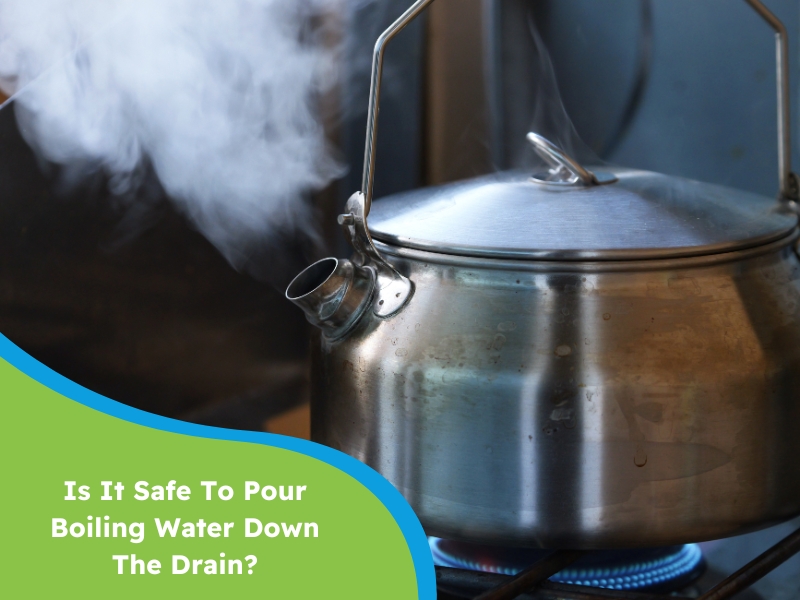When dealing with a slow or blocked drain, it’s tempting to reach for the kettle and pour boiling water down the drain as a quick fix. But is this safe? While boiling water can be adequate in some situations, it’s not always the best solution—and in some cases, it can even cause damage. This article will explore the pros and cons of using boiling water to clear drains, eco-friendly alternatives, and tips to keep your plumbing in shape.
What happens when you pour boiling water down the drain?
Boiling water might seem like a quick fix, but it can lead to unintended consequences. Here’s what happens when you pour it down your sink:
- PVC pipes can soften – Many homes have PVC (plastic) pipes that aren’t designed to withstand extreme temperatures. Boiling water can soften and warp these pipes, leading to cracks or leaks.
- Metal pipes expand and contract—Older homes with metal pipes might be unsafe. Extreme heat can cause them to expand rapidly and contract when cooled, stressing joints and causing long-term wear.
- Grease melts but re-solidifies further down – If you’re dealing with a grease clog, boiling water might seem like a good idea. However, instead of removing grease, it can push it further down, where it cools and solidifies, leading to a deeper blockage.
- Soap scum and food particles harden – Boiling water can cause some debris, like soap scum or food waste, to harden inside pipes, making the clog even worse.
Can boiling water damage your pipes?
The impact of boiling water depends on your plumbing system and the frequency of use. Here’s how it can affect different pipes:
- PVC pipes – These can start softening at around 60°C. Boiling water (100°C) exceeds what PVC can handle, leading to warping or damage over time.
- Metal pipes – While copper and steel pipes can withstand heat better, repeated exposure to boiling water can weaken joints and seals, increasing the risk of leaks.
- Older plumbing systems – If your pipes are already fragile due to age or wear, sudden temperature changes can accelerate deterioration and cause cracks.
- Sewage pipes – If your home has clay or cast iron underground pipes, boiling water is unlikely to cause immediate damage. Still, it won’t solve deep blockages either.
Does boiling water help with a blocked drain?
Situation | Position |
Clearing mild soap buildup in bathroom sinks | ✅ Effective |
Flushing out light debris like small food particles | ✅ Effective |
Loosening minor grease stains near the drain opening | ✅ Effective |
Thick grease clogs (deep in pipes) | ❌ Ineffective – pushes grease deeper |
Hair or soap scum blockages | ❌ Ineffective – doesn’t dissolve easily |
Tree roots or misaligned pipes | ❌ Ineffective – needs professional help |
Boiling water can help with mild clogs like soap buildup and small food particles, but it’s ineffective for tougher blockages like thick grease, hair, or tree roots, which require professional assistance.
What are the risks of using boiling water for drain cleaning?
Even if boiling water appears to clear minor clogs, it can pose risks, especially with frequent use. Here’s what you need to consider:
- Pipe damage – Over time, extreme heat can weaken pipes, leading to leaks or costly repairs.
- Safety Hazards: Handling boiling water poses a risk of burns or scalds. Additionally, if the water splashes back due to a blockage, it can cause injury.
- Temporary solutions – While boiling water might provide short-term relief, it doesn’t address the root cause of blockages.
- Environmental concerns – Dumping excessive hot water regularly can strain wastewater systems, particularly in older infrastructure.
Is boiling water a safe solution for grease buildup in drains?
Grease is one of the biggest culprits behind stubborn drain clogs. But does boiling water help?
- Melts grease temporarily – Boiling water can liquefy grease, but only briefly.
- Pushes grease deeper – Instead of removing grease, the hot water carries it further down the drain, where it cools and solidifies.
- Causes more significant clogs – Once the grease cools, it sticks to the pipes and traps other debris, leading to a more stubborn blockage.
- Better solution: Use eco-friendly degreasers or a mixture of baking soda and vinegar to break down grease safely.
What eco-friendly alternatives exist for clearing a blocked drain?
Instead of relying on boiling water, try these sustainable and effective drain-cleaning solutions:
- Baking soda and vinegar: Pour baking soda and vinegar down the drain. Let it fizz for a few minutes before flushing with warm water.
- Hot (not boiling) water and dish soap – This works well for breaking down minor grease buildup.
- Plunging – A good plunger can help dislodge blockages without chemicals.
- Drain snake – Physically removing hair and debris is safer and more effective than hot water.
- Enzyme-based cleaners – These break down organic matter naturally without harming pipes.

How can you prevent drain blockages without harsh methods?
Prevention is the best solution. Here’s how to keep your drains clear without resorting to extreme measures:
- Schedule regular drain maintenance – A professional blocked drain plumber can inspect and clean drains before they become problematic.
- Dispose of grease properly—never pour oil or grease down the drain. Let it solidify before throwing it in the bin.
- Use drain strainers – Catch food scraps, hair, and debris before they reach your pipes.
- Run hot water regularly – Warm (not boiling) water can help flush out minor buildup.
When should you call a professional for drain issues?
If your drains are frequently clogged, it’s time to call an expert. Here’s when professional help is needed:
- Persistent slow drainage – There may be a deeper issue if clogs keep returning.
- Gurgling sounds – Air pockets or blockages can cause unusual noises.
- Standing water – The blockage is severe if the water isn’t draining.
- Foul odours – Bad smells from the kitchen sink indicate trapped food, grease, or bacterial growth.
- Visible leaks – Damage to pipes needs immediate attention.
A smarter way to keep drains clear
Pouring boiling water down the drain might seem like a simple fix, but it can do more harm than good. It can damage pipes, worsen grease clogs, and fail to remove stubborn blockages. Instead, use eco-friendly methods like baking soda and vinegar, enzyme cleaners, and regular maintenance to keep your drains running smoothly.
If you’re dealing with a stubborn blockage or want to ensure your plumbing is in top condition, Eco Plumbers 24/7 is here to help. Based in Sydney, we offer a comprehensive range of eco-conscious plumbing services, including emergency repairs, drain cleaning, and preventative maintenance. Our team, led by Michael, is committed to providing sustainable solutions that protect your home and the environment. Don’t let a blocked drain ruin your day—Contact Eco Plumbers 24/7 today for reliable, eco-friendly plumbing services!

